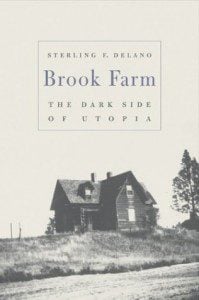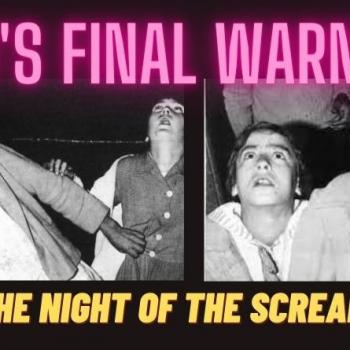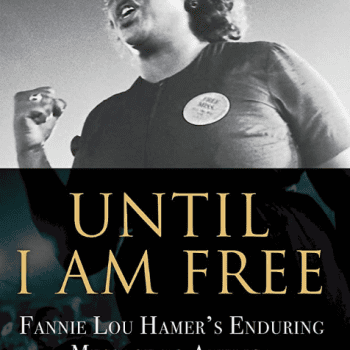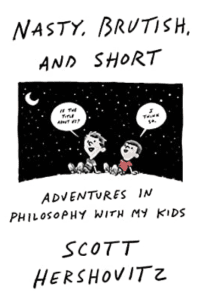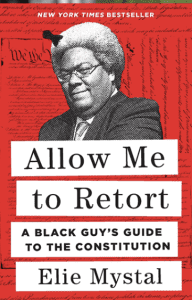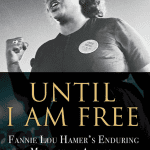I first came to Woody Guthrie (1912-1967) by way of Bob Dylan (1941-). Regarding Guthrie’s influence on him, Dylan said, “You could listen to his songs and actually learn how to live” (Seymour, 21).
The two singer-songwriters only met once. In 1961, when Dylan was 19 years old, he visited Guthrie in the hospital. Guthrie was 48 years old and receiving treatment for the neurodegenerative condition of Huntington’s Disease, which he inherited from his mother (Edington 79).
Two years later in 1963, at the end of a concert in New York, Dylan returned to the stage for an encore and did something he has never done again, although there is a recording that is widely available. Dylan said that he had been asked to contribute to a forthcoming book about his idol. The editors asked him, “What does Woody Guthrie mean to you—in twenty-five words?” Dylan confessed: “I couldn’t do it.” He couldn’t distill Guthrie’s impact on him into 25 words. Instead, Dylan said, “I wrote out five pages.” He then launched into a remarkable seven-minute-long spoken word poem titled “Last Thoughts On Woody Guthrie.”
The full poem is more than 1,700 words, so I will share with you only the final two stanzas. But even this snippet will give a sense of what Dylan was trying to point to when he said that, “You could listen to [Woody Guthrie’s] songs and actually learn how to live”:
And where do you look for this hope that yer seekin’
Where do you look for this lamp that’s a-burnin’
Where do you look for this oil well gushin’
Where do you look for this candle that’s glowin’
Where do you look for this hope that you know is there
And out there somewhere
And your feet can only walk down two kinds of roads
Your eyes can only look through two kinds of windows
Your nose can only smell two kinds of hallways
You can touch and twist
And turn two kinds of doorknobs
You can either go to the church of your choice
Or you can go to Brooklyn State Hospital
You’ll find God in the church of your choice
You’ll find Woody Guthrie in Brooklyn State Hospital
And though it’s only my opinion
I may be right or wrong
You’ll find them both
In the Grand Canyon
At sundown
Woodie Guthrie died four years later in 1967 at the age of 55, but in his short life he wrote more than 3,000 songs (Seymour 21). He had a profound influence, not only on Dylan, but also on many other musicians, including Pete Seeger, John Lennon, Ani Di Franco, Steve Earle, and Rosanne Cash (25).
One of the reasons for Guthrie’s lasting influence was his commitment to writing songs that call us to be part of something bigger than ourselves, to join together to build the world we dream about, and to turn our dreams into deeds.
There’s an iconic poster of Woody Guthrie that can be spotted in many college dorm rooms and on the walls of various social justice organizations. As I read the words emblazoned on that poster, see if you can hear some of the intonation and rhythm that inspired Dylan’s poem we heard earlier:
I hate a song that makes you think you are not any good. I hate a song that makes you think that you are just born to lose. Bound to lose. No good to nobody. No good for nothing. Because you are too old or too young or too fat or too slim. Too ugly or too this or too that. Songs that run you down or poke fun at you on account of your bad luck or hard traveling. I’m out to fight those songs to my very last breath of air and my last drop of blood.
The original context of that quote continues:
“I am out to sing songs that will prove to you that this is your world and that if it has hit you pretty hard and knocked you for a dozen loops, no matter what color, what size you are, how you are built, I am out to sing the songs that make you take pride in yourself and in your work. And the songs that I sing are made up for the most part by all sorts of folks just about like you.” (23)
There’s one other important earlier passage from that original text that says, “I don’t sing any songs that are not real. I don’t sing any silly or jerky songs, nor any songs that make fun of your color, your race, the color of your eyes or the shape of your stomach or the shape of your nose” (Stadler 17-18). Keep in mind that this was Guthrie’s public stance on racial justice in 1944, a decade before the launch of the Civil Rights Movement.
Guthrie was acutely aware in his own time—as we have seen play out over the past few years in our country’s politics—that economic anxieties, xenophobia, racism, and more can combine to make people vulnerable to the false promises of demagogues. At worst, demagoguery can devolve into authoritarianism and fascism.
Guthrie wrote that, “Fascism would like for you to weep and hang your head and cry and get so mixed up in your thinking that you’d walk into one of its own churches looking for some kind of a personal salvation” (13). Guthrie inscribed in all capital letters on his guitar, “THIS MACHINE KILLS FASCISTS” (37). And as he used to sing:
I’m gonna tell you fascists
You may be surprised
The people in this world
Are getting organized
You’re bound to lose
You fascists bound to lose
Guthrie believed in the power of music to bring people together. He was driven by a deep “concern for working and poor people’s emotional well-being.” And he used his music to embolden individuals to claim their inherent worth and dignity, and to inspire them to join in coalition to build a better world that works for everyone, not merely for an elite few (12).
It is also important to be honest that, for those who knew Guthrie best, this towering social justice figure could be hard to live with. He was married three times, and cheated repeatedly on his marriage vows (14). As Pete Seeger once said, “I can’t stand him when he’s around, but I miss him when he’s gone” (66).
This dynamic connects back to our exploration last week that we imperfect humans beings can be phenomenally gifted and advanced in one or more areas of development while being underdeveloped in other important areas. Multiple things can be true. We Homo sapiens are not purely rational. We are nothing if not inconsistent. In the words of Woody Guthrie’s biographer, “We need him, not as an icon, but as a complicated, uncategorizable thinker, who can help us imagine how a more just world-to-come might feel” (197).
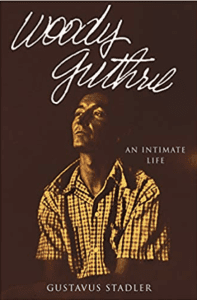 I was inspired to plan this post when Beacon Press published a book recently titled Woody Guthrie: An Intimate Life, by Gustavus Stadler, an English professor at Haverford College. It’s an interesting and accessible book, although in the spirit of full disclosure, I will warn you that there was, for me, just a little more detail than I really needed to know about Guthrie’s sex life. Your mileage may vary. I also learned a lot from another book titled Bring Your Own God: The Spirituality of Woody Guthrie, by my colleague The Rev. Stephen Edington, Minister Emeritus of a UU congregation in New Hampshire. So those are two good starting points, if this post leaves you curious to learn more.
I was inspired to plan this post when Beacon Press published a book recently titled Woody Guthrie: An Intimate Life, by Gustavus Stadler, an English professor at Haverford College. It’s an interesting and accessible book, although in the spirit of full disclosure, I will warn you that there was, for me, just a little more detail than I really needed to know about Guthrie’s sex life. Your mileage may vary. I also learned a lot from another book titled Bring Your Own God: The Spirituality of Woody Guthrie, by my colleague The Rev. Stephen Edington, Minister Emeritus of a UU congregation in New Hampshire. So those are two good starting points, if this post leaves you curious to learn more.
If Woody Guthrie is known best for one thing, it is probably for writing the song “This Land is Your Land.” As the story goes, he had grown tired of hearing performances of Irving Berlin’s “God Bless America,” which he judged to be a “bloated, supercilious proclamation of nationalism.” To give people options of what to sing that evoked a fuller range of feelings involved in trying to love America, he wrote an alternative anthem about “traveling the continent, witnessing its beauty but also its despair and exploitation” (27).
If you read all the lyrics to “This Land Is Your Land,” there’s some radical stuff in there. Some of you may recall that in 2008, as part of President Obama’s Inauguration, Pete Seeger did just that: sang all the verses to “This Land Is Your Land” in a concert for the new President. Most notably, there’s a verse in which Guthrie stumbles upon a sign that says, “Private Property.” In response, he sings, “On the other side, it didn’t say nothin’ / That side was made for you and me” (46).
“This Land Is Your Land” is arguably a significant improvement over “God Bless America.” I mean, can we at least say, “God bless the people of every nation?!” As the bumper sticker says, “I love my country, but I think we need to start seeing other people!”
It is, however, also important to add that the Indigenous People’s Rights movement has made us aware that this particular Guthrie song needs to be decolonized. A statement from the Cherokee Nation says, “‘This Land’ omit[s] mention of the U.S. government’s policies that dispossessed tribes across the United States of their original homelands” (Seymour 24). We have to keep widening our circles of compassion. In his time, Guthrie helped us widen our circles of inclusion with “This Land Is Your Land.” Now, in our own time, we need to keep widening those circles as our collective social conscience and multicultural awareness continues to evolve and expand.
If Woody Guthrie is known for a second thing, it is for being a labor rights activist. Indeed, he has a song titled “Union’s My Religion.” Some of the lyrics go like this:
When I seen my union vision
Then I made a quick decision
Yes, that union’s my religion;
That I know.”
He titled a similar song, titled “Good Old Union Feeling” (Stadler 67). Guthrie deeply believed in workers coming together to advocate for themselves through collective action.
In his words:
One of the worst things about capitalist society is that it teaches us to “go it alone” and to get “independent” and to “hit the top” and to “retire early” and to not waste our time and money socializing or unionizing or thinking and planning in a good union way. This thing of “unionism” is the only lure and bait that any religion has really held out for anybody and their best slogan has been “love thy neighbor”—(work and think and plan along with your fellow worker)…. The best part about the union hall is that it teaches you how to be free to talk and think and to hear that you are some good to somebody, some use, some help to the people of the world. A sweetheart can help to tell you this. A fellow union member can too. But if you don’t hear it sung, talked, danced, acted, spoken, and over and over and over—you get to thinking you don’t count for much. (69)
I love that Guthrie explicitly makes the connection between how religion and labor unions at their best function similarly. It’s part of why many of us seek out progressive, open-minded, open-hearted religious communities; we need to be reminded by one another of our inherent worth and dignity. We need to be together to plan how we can act in solidarity across our differences to build a beloved community.
And although Guthrie is best known for “This Land Is Your Land” and for being a labor activist, he also wrote numerous songs about racial justice (169). For example, he spoke out publicly against the racist, cruel and unjust Japanese Internment camps in this country during World War II (170).
Related to racial justice, Guthrie wrote a song 1951 titled “Old Man Trump.” At that point, our 45th President was only around five years old. It turns out that Donald’s father Fred Trump was Woody Guthrie’s landlord for a time when he lived in Brooklyn, New York.
Guthrie came to notice that oddly enough, all the occupants of the building were white; after doing some digging, he discovered that there was indeed an actual “whites only” policy. Guthrie wrote the song “Old Man Trump” to support the movement that eventually succeeded in overturning this discriminatory, segregationist rental policy (180).
As I move toward my conclusion, I want to highlight a few pieces of one other lesser known aspect of Guthrie— his progressive spirituality. When he was a child, his family was not part of any formal religion (Edington 6). Nevertheless, he does have a number of songs that emphasize the ways that Jesus, rightly understood, can be a powerful symbol for inspiring the poor to demand a more just economic system (32, 34-35).
I’m also unaware of any formal Guthrie-connection to Unitarianism or Universalism—but I do see him as one among many exemplars of the UU 2nd Source: “Words and deeds of prophetic people which challenge us to confront powers and structures of evil with justice, compassion, and the transforming power of love.” And there are many Woody Guthrie quotes that feel very UU. For instance, he said, “I myself am a master and student of all faiths and all creeds, seeing the same general spiritual feelings and ideas present in them all that is always living in the oneness of the human race, its blending and its mixtures of all colors, all kinds” (25).
For him, there really was a religious component to his union activism. He even saw the whole universe that way—spiritually. In his words, “The universe is a great symphony (a great union?), and the stars, planets, the earth, and us people are just one great dance…. I simply believe in mono-unionism, in One Big Union which includes all people and all things” (52-3).
In another very UU move, toward the end of his life, when his suffering from Huntington’s Disease was nearing its height, instead of limiting himself to the Christian Bible from two thousand years ago, he wrote his own scripture that he titled “My Bible.” The full version is twenty-three pages, but I’ll give you a few representative excerpts:
My bible tells me how it is that love is all.
My bible tells me how it is that my soul is so big it can’t ever, ever, ever get lost.
My bible tells me I must bear up and try my best to carry on.
My bible makes me love you instead of hating you.
My bible makes me treat you good in place of bad.
My bible makes me love peace.
My bible makes me try to hold on and to try to live all I can even when my pains and my sorrows and my miseries all try to make my living worse than death.
My bible heals me now and here.
My bible keeps me wise in all ways.
My bible sings me my ballad of truth.
My bible sings to me out of all ages.
Although Woody Guthrie is no longer with us, his life, his songs, and his art remain as a legacy to “help us imagine how a more just world-to-come might feel.”
The Rev. Dr. Carl Gregg is a certified spiritual director, a D.Min. graduate of San Francisco Theological Seminary, and the minister of the Unitarian Universalist Congregation of Frederick, Maryland. Follow him on Facebook (facebook.com/carlgregg) and Twitter (@carlgregg).
Learn more about Unitarian Universalism: http://www.uua.org/beliefs/principles




